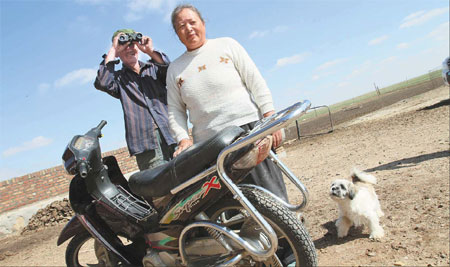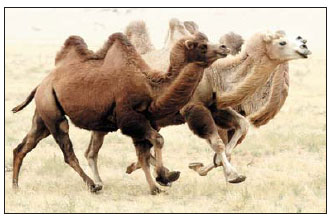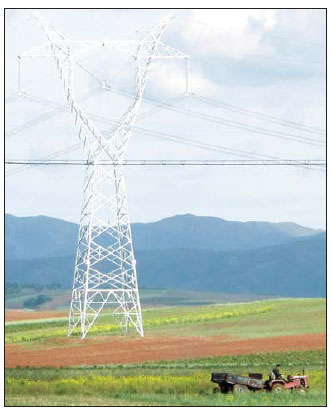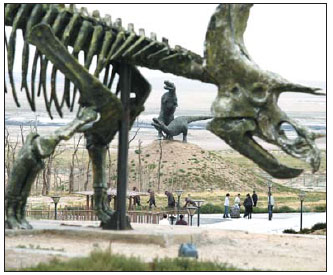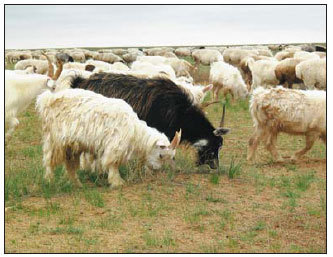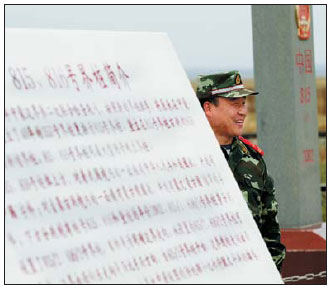Life and Leisure
Little house on the grassland
By Li Xing (China Daily)
Updated: 2010-10-11 08:00
 |
Large Medium Small |
|
Liu Jinlian and her husband Zu Shoushan show off their motorbike and Russian-made binoculars, in Xilin Gol League, Inner Mongolia autonomous region. [Photos by Jiang Dong / China Daily] |
|
The grassland of Xilin Gol is home to Bactrian camels. Although they are domesticated, they are under State protection. |
|
Agriculture and energy resources are a significant part of Inner Mongolia's economy. [Li Xing/China Daily] |
|
Visitors to Erenhot Museum can find out more about the dinosaurs which roamed the area some 70 million years ago. |
|
Sheep graze on the fertile grassland. [Photo by Sun Chenbei / For China Daily] |
|
A border guard on the China-Mongolia border in Erenhot. |
Herders maintain a traditional way of life while natural resources are intensively developed in Inner Mongolia autonomous region. Li Xing reports
Pelting rain obscured the road ahead when our driver veered right, following old tire marks on the grassland in Zhenglan Banner of Xilin Gol League, in Inner Mongolia autonomous region.
Before long, a few lights could be seen through the rain and darkness. When our Land Cruiser stopped, my fellow travelers and I found ourselves in front of a two-room brick house fronted with a porch.
It was the first stop on our three-day fact-finding tour of energy and natural resource development facilities in the area, in mid-September. We were lucky to have a knowledgeable driver, Zhang Jiancheng. An employee with the prefecture development and reform commission, Zhang is often on the road with top commission officials, as they do fieldwork in order to draft growth plans and supervise new projects.
The short excursion enabled us to see beyond the prairie and experience the excitement of a part of Inner Mongolia where the economy is booming and many people are prospering.
Although Xilin Gol is as big as Jiangsu and Zhejiang provinces combined, it has a population of just 1 million people, compared with 126 million for Jiangsu and Zhejiang.
Our hosts, Siqin Blig and his wife, Suden Gaowa, ushered us into a small room, that had a bed and a table laid out with local snacks, including cheese and soft cream. While we enjoyed sampling the food, Siqin Blig chatted about changes that Mongolian nomadic families have experienced over the past 20 years.
Xilin Gol owns a fertile plot of Mongolian grassland. For some time after reforms kicked in during the late 1970s, herdsmen typically believed the more sheep or cattle they raised, the richer they would be. By the mid-1980s, the number of sheep in the region rose to more than 1 million.
Some 15 years ago, when Siqin Blig had just got married, the couple herded some 300 sheep.
"All three of us brothers got a motorbike," Siqin Blig said.
But before long, they found the grass was becoming shorter every year and their herds did not have enough to eat.
"Harsh reality persuaded herders to buy into the idea of ecological husbandry," said Feng Jianjun, director of the county's development and reform bureau.
Siqin Blig now tends some 100 sheep and 50-plus cattle on 93 hectares of grassland, under the terms of a 30-year contract he sealed with Gacha village.
He said his family's annual income is mid-level for the area. His daughter is 15 and is a middle school student. A bronze plaque on the windowsill from the local government shows his family is classed as a model unit producing fine wool.
The family built the brick house a few years ago, with their mud-brick house serving as a kitchen. The largest room is the bedroom, which has a television, freezer, sofa and several armchairs. There is also a conspicuous painting of sacred Tibetan Buddhist monasteries.
We were served a plate of steaming boiled mutton from the family herd. Many leading hotpot restaurants claim their best mutton comes from Xilin Gol.
Over three days we drove more than 1,000 km, less than half of Xilin Gol, but saw with our own eyes how geological transformations have shaped the vast grassland and its meandering rivers. The rolling hills with their flat tops are testimony to a time when small volcanoes simultaneously erupted.
Some 70 million years ago, dinosaurs roamed the area, which was covered with lush forests, rivers and marshes. In Erenhot, scientists have discovered about a dozen species of dinosaurs. At Erenhot Museum visitors can observe paleontologists doing their research on dinosaurs.
On our travels we passed a succession of wind farms, open-pit coal mines and coal-fired power plants. Many of the mobile phone towers have solar panels to supply power.
Zhang, our driver, signaled changes in the grasslands, from rich to more barren areas. We stopped now and then to take photos of herds of sheep, cattle and horses. We also chanced upon a herd of Bactrian camels. Plump, with two humps on the back, the camels are categorized as third-class wildlife under State protection.
"The herdsmen have to get permission from county-level administration to kill one," Zhang said.
We made our last stop at the house of Liu Jinlian, in Sonid Right Banner.
Liu, 53, and her husband, Zu Shoushan, 58, are ethnically Han and are second-generation herders in Inner Mongolia. The rooms of their brick house are sparely furnished with a kang - traditional brick bed - a couple of wood cabinets, stools and a 9-inch television. Apart from their herd of more than 200 sheep, they also keep three donkeys, a cat and a pet dog.
The most luxurious items in the household are two motorcycles, while Zu has a pair of Russian-made binoculars. They buy drinking water from the nearby town.
Although their wind generator and battery cells are old, and they occasionally have to spend the night in the dark, Liu's loud voice and Zu's earnest demonstration of his binoculars show they are optimists.
"Policies are good and life is good," Zu said.
They are proud that one of their sons now works in Shanghai as a technician. Their two other children work in the nearby town. Will they one day join their children in town, or in Shanghai?
"We haven't made up our minds," Liu said. "We don't want to give up our own livelihood."
